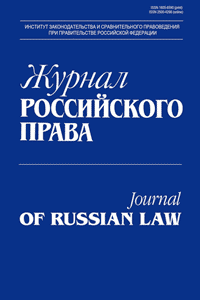The article deals with the issues, related to the problem of correlation between law, religion, morality and cultural traditions in the context of criminal behavior. The article analyses tendencies in determinism of philosophical-religious beliefs developed on the basis of centuries-long experience of Christianity, and their influence on the formation and development of the domestic criminal legislation. In her research the author founds upon such sources as the Statute of Prince Vladimir, the Russian Truth, the Code of Tsar Aleksey Mikhailovich. The author draws the conclusion that throughout the whole period of the Christian religion existence, the church and the state have never stayed apart from each other. The church has had a major impact on various aspects of social life, including formation of the customary law, which was one of the factors that seriously affected the development of the modern criminal legislation. Criminal law and the legislation of the pre-revolution Russia had gone hand-inhand with the Christian religion all the way up through the October Revolution of 1917, always finding from its ally spiritual support and canonic recipes to criminalize certain socially dangerous actions, and also to differentiate responsibility and individualize punishment.
Religion, Christianity, church, criminal law, crime, punishment, criminal legislation.
1. Il´in A. V., Morozova S. A. Iz istorii prava. SPb., 1996.
2. Rassel Dzh. Sobornoe ulozhenie 1649 goda. M., 2012.
3. Rassel Dzh. Tserkovnyy Ustav Vladimira. M., 2013.
4. Rossiyskoe zakonodatel´stvo X-XX vekov: v 9 t. T. 3: Akty zemskikh soborov. M., 1985.
5. Rossiyskoe zakonodatel´stvo X-XX vekov: v 9 t. T. 6: Zakonodatel´stvo pervoy poloviny XIX veka. M., 1988.
6. Rybakov B. A. Rozhdenie Rusi. M., 2004.








